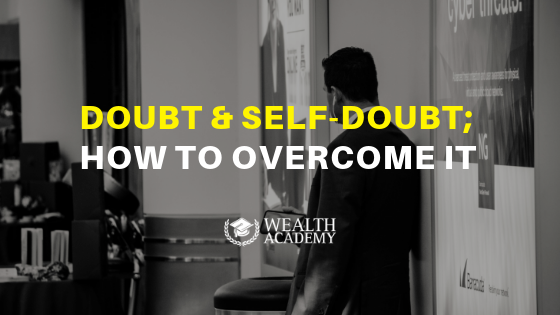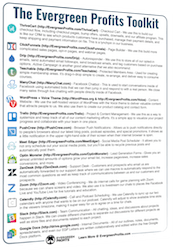It’s easy to let circumstances and self–doubt sabotage your business. These tips will help you conquer your self–doubt, and become a more meaningful. Not only for yourself but also how you can help other overcome doubts they have.
Everyone grapples with self-doubt once in a while, even successful business owners. A little self-doubt is not only normal, it’s healthy. It prevents a leader from crossing the fine line between self-confidence and hubris. But highly successful people don’t let self-doubt derail them from what they set out to accomplish.
For example, the latest Price WaterhouseCoopers Annual CEO Survey found that despite the turbulence in today’s global economic climate, when it comes to their own companies, CEOs are taking deliberate, focused steps to grow by investing where it counts.
As the study reveals, CEOs are three times more confident in their own abilities to grow their businesses than they are of the growth prospects of the global economy. These CEOs didn’t let events around them stop them in their tracks. As one CEO put it, competition is fierce in every industry, but that just means that we have to run faster and harder.
Allowing self-doubt to prevent you from grabbing opportunities that come your way is an act of self-sabotage. How can you deal with self-doubt in a constructive way?
1. Break Self-Doubt By Stop Making Excuses
Self-doubt often makes us rationalize a situation to fit our emotional state. We may be afraid to fail, afraid to look bad, afraid to take on more than we think we can handle. So we become adept at making a lot of excuses for why an opportunity that presents itself isn’t a good fit.
As Steven Pressfield says in Do The Work! Overcome Resistance And Get Out Of Your Own Way, “The enemy is our chattering brain, which, if we give it so much as a nanosecond, will start producing excuses, alibis, transparent self-justifications, and a million reasons why we can’t/shouldn’t/won’t do what we know we need to do.” Think back on opportunities you turned down. What reasons did you give yourself? Where these legitimate reasons or just excuses? Excuses are mental barriers we erect that hold us back.
2. Reject Doubtful People
There is a popular saying that we are the average of the five people we spend the most time with. While there is no scientific study to support this notion, there is a kernel of truth in the statement: Those we habitually spend time with can have a profound effect on us, whether we are aware of it or not. We know from brain plasticity research that experiences reorganize neural pathways in the brain.
According to Dr. John Kounios, professor of psychology and brain science at Drexel University, our neural connections change even after a 20-minute conversation! Who do you spend the most time with? What effect do they have on you? When you spend time with them, do you walk away feeling better about yourself or worse? “At the end of the day,” says Leo Babauta, creator of Zen Habits, “the questions we ask of ourselves determine the type of people we will become.”
3. Raise Your Self-Awareness
Self-awareness is one of the most powerful personal development tools in your arsenal. Make use of it by understanding the root causes of your self-doubt. What specific situations trigger bouts of self-doubt? If it’s a lack of skill in an area, resolve to do something about it.
For example, it may be a fear of delivering presentations. Or it may be anxiety at having to make cold calls. Just about anything can be learned. Go out there and get the training you need, or get a coach to help you.
4. Practice Self-Compassion
While it’s easy to extend compassion to others, very few people are able to temper their self-criticism with self-compassion. Self-compassion is simply being kind to oneself. Studies show that there is a strong correlation between self-compassion and positive mental health, such as reduced anxiety and greater life satisfaction, as well as higher self-esteem. Dr. Kristen Neff, of the University of Texas at Austin—dubbed the compassion evangelist—developed a self-compassion test.
For example, when you fail at something that’s important to you, do you keep things in perspective, or do you become consumed by feelings of inadequacy? When something doesn’t go right, do you try to keep your emotions in balance?
Self-compassion develops emotional resilience. To become better at this, Dr. Neff advises a three-step process: Notice your own suffering, especially when it’s caused by your self-judgment or self-criticism; don’t be cold-hearted toward yourself, and remember that imperfection is a part of our shared human experience. As Neff puts it, “Where’s the contract you signed when you were born that said that you would be perfect?”
5. Stop Asking For Validation From Doubtful People
Seeking others’ input and advice is helpful. However, if you are in the habit of continuously asking others what they think before making decisions on important matters, you might be weakening your faith in yourself.
For example, if you’re working on a presentation, setting up a website or undertaking a new project, and you continue to change what you have created based on feedback you receive, you might end up losing your voice and the end product becomes a diluted version of you.
Take some advice, but at some point, make a decision on what feels right to you.
6. Don’t Talk About Your Plans With Doubtful People
“I never talk about a project I’m working on,” Pressfield says. “It’s bad luck.” He’s not the first person who advises us to keep our mouths shut about our impending goals. Derek Sivers, professional musician and entrepreneur, popularized this notion in “Keep Your Goals To Yourself,” one of the most watched TED presentations.
As Sivers shows, psychology studies have proven that when we tell someone our goal, and they acknowledge it, we are less likely to do the work that is necessary to accomplish the goal. This is because our brain mistakes the talking for the doing. In other words, the gratification that we receive from the social acknowledgment tricks our brain into feeling that the goal has already been accomplished. The satisfaction we experience in the tellingremoves the motivation to do whatever it takes to actually make it happen.
7. Trust Your Entrepreneurial Values
In Disrupt! Think Epic! Be Epic!, author Bill Jensen outlines the 25 successful habits of 100 contemporary heroes—people who found ways to cut through the complexity of today’s fast-paced, ever-changing environments to do extraordinary things. These are individuals such as Marissa Mayer, CEO of Yahoo; Garret Camp, founder of Stumble Upon, and Guy Kawasaki, author and entrepreneur.
The trait driving the majority of the best practices for these 100 entrepreneurs is “Trusting Your Gut and Values.” More and more, we are called upon to make quick decisions with very little information. When you know what you stand for and what is important to you, it becomes easier to make decisions that are aligned with your values, with what matters to you. Self-doubt cripples our ability to make important decisions—knowing yourself and living your values is one of the best antidotes to self-doubt.
One of the many practical tips Jensen provides is to find two mentors, one twice your age and one half your age. One will share the wisdom of experience; the other will take you on an unknown path. Drawing from these wells will strengthen your trust in your ability to pursue your goals. You can also download a free online toolkit, which is a “how to addendum” for the 25 successful habits.
8. Start Shipping
There is one voice that is tirelessly pushing every budding entrepreneur to stop stalling and “go make something happen.” That voice is Seth Godin, American entrepreneur and author. Anyone who follows Seth knows one of his most insistent messages is to “start shipping!”
If you’re an artist holding back from exhibiting your work because you don’t feel it’s your best work yet, if you’re a writer struggling with a manuscript until it reaches Flaubertian perfection, if you have developed an app but are afraid to take it to the next step: This message is for you. You may be holding back because you don’t want to be vulnerable—exposing yourself and your ideas to the world and running the risk of criticism, or failing.
What ideas are buried because you distrust yourself? Perhaps you want to start a healthy fast food truck business in your city, or you have an idea for developing a glucose counter; perhaps you are mulling over starting a home business to create old-fashioned candy as your grandmother used to make, or starting a day-care business that ensures happy and healthy pets.
Self-doubt is mental paralysis. The only cure for it is having the guts to get started.
Read more articles on entrepreneurship.
About The Author
Your Millionaire Mentor
Shaqir Hussyin


Shaqir Hussyin is the founder and CEO of Shaqirhussyin.com & Funnels.com Nicknamed the “Backpack Millionaire”, he’s invested $350,000 into his own education and training. Whilst traveling to 100+ countries, Shaqir has built over 10+ million dollar brands and attracted over 500,000+ subscribers.
His signature program is now available at: CreateDigitalCourse.comspecially designed for aspiring entrepreneurs wanting to start their online business with their very own high paying product.
Shaqir is also a highly sought-after speaker and direct response “Sales Funnels” global leader you can meet in person. His work has impacted over 100,000 businesses in 65 different countries. Connect with Shaqir on Instagram, YouTube, LinkedIn & FB Group.








